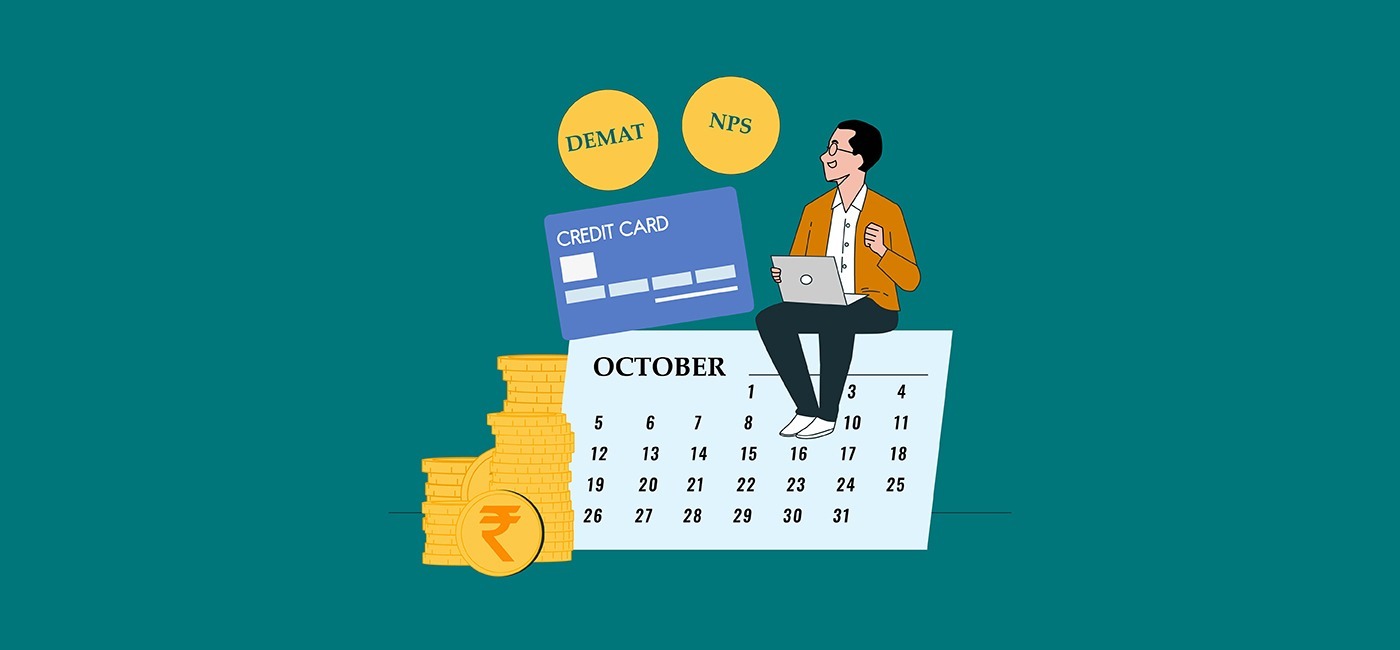Rules change and modify. From October 1st 2022, the government has made several changes to the regulations of credit card usage, Atal Pension Yojana, Demat account, and National Pension Scheme (NPS) that will affect how you spend, save, and invest your money. The money changes (October rules) have been in the works for a long time and were extensively discussed; however, if you have missed it, we have an explainer just for you.
Credit Card Activation Rules
The RBI’s Credit Card and Debit Card- Issuance and Conduct, 2022 rules that came into effect on July 1st 2022, added three new credit card rules that went into effect starting October 2022.
An OTP to activate the new credit card: The credit card issuing company must obtain a one-time password (OTP) as consent to activate the card if it has not been activated for more than 30 days from the date of issuance. If the cardholder does not consent, then the card issuers must close the credit card account without any cost to the customer within seven working days from the date of seeking confirmation from the customer.
Cap on credit limit should be maintained: The credit card issuing company must not ensure that the card’s limit is not enhanced without the cardholder’s explicit written consent.
No capitalization of unpaid charges/ interest/ dues/ taxes: The terms and conditions for payment of credit card dues, including the minimum amount due, shall be specified to ensure no negative repayment. Capitalization of unpaid charges means the addition of the outstanding dues to the principal balance of the credit card due. In addition, the new credit card rules restrict card issuers from capitalizing for charging/compounding interest.
Impact on users
The money changes (October rules) for credit cards aim to reduce the exploitation of credit card holders by the card issuing companies and bring in more transparency in the credit card bill calculation.
If you have received your new credit card, ensure that you activate it within 30 days from the date of issue. Also, if the card issuing company raises the credit limit without written consent, you can file a complaint with RBI for non-compliance with the rules.
RBI Card Tokenization
RBI card tokenization is one of the most crucial money changes on the list, changing how we use our credit and debit cards in online transactions.
Unlike before, in the card tokenization process, online merchants (e-commerce platforms) will not be allowed to store customer card details like card number, expiry date, and the CVV on the platform. Instead, the card details will now be replaced and stored with an alternative code called a token that will mask the actual card details, providing cardholders with greater security.
So, whenever you initiate an online transaction using your card, the saved token information on the platform will be used to process the transaction.
Following are the steps to generate a token for your card:
- First, visit an e-commerce platform where you intend to make a purchase using your credit or debit card.
- On the check-out page, select the card you use to make payment, provide the CVV number, or enter the card details.
- A pop-up on the screen will appear asking you to select- “Secure your Card or Save your Card as per RBI Guideline.”
- Enter the OTP you receive on your registered mobile number to complete the process
- Once done, your card detail is successfully tokenized on the e-commerce platform.
Impact on users
The credit card money changes (October rules) will prevent fraud and unauthorized use of sensitive customer data and card details, adding more security to your online digital payments.
Atal Pension Yojana scheme closes for Income Tax Payers.
The most significant is the money changes October rule for Atal Pension Yojana (APY) scheme. The government has restricted income-tax payers from enrolling in the APY scheme from October 1st 2022. Income-tax payers are those liable to pay income tax as per the Income Tax Act of 1961.
The new APY rules will not apply to existing subscribers, and they can claim deductions on the contribution made under Section 80CCD (1) of the Income Tax Act.
Impact on users
After the new money changes (October rule) for APY, tax-paying individuals looking to subscribe to the APY scheme will have to opt for alternative pension schemes like NPS or any other retirement savings scheme to plan for retirement effectively.
Change in Demat Account Login Requirements
According to the National Stock Exchange circular issued on June 14th, 2022, Demat account holders will require two-factor authentication to access their accounts from October 1st, 2022.
Of the two factors, one of the authentication factors shall be biometric authentication (fingerprint), and another one should be the knowledge factor (PIN or password) or possession factor (OTP, security token, or authenticator app). In addition, the holder must receive the OTP on their registered email id and mobile number.
If biometric authentication is impossible, the Demat account rules state that the holder must use the User ID, Knowledge Factor, and Possession Factor to access the account.
Impact of users
The changes (October rules) for the Demat account login process have been made to make the account access more secure and prevent unauthorized use by any third person.
- Go to the profile section of your Demat account through the web portal or mobile application to add biometric detail, and then select the Password/ Security option.
- Click on the two-factor authentication option to add biometric details.
- Enter the OTP you received on your registered mobile number to save the fingerprint.
You can also refer to your stock broker’s knowledge centre or the FAQ section for enabling two-factor authentication.
Changes in E-nomination Procedure for NPS Subscribers
The procedural flow of e-nomination of corporate/government sector NPS subscribers has been changed from October 1st, according to the Pension Fund Regulatory and Development Authority (PFRDA).
In the money changes (October) rules for NPS subscribers, PFRDA states that once the subscriber initiates the e-nomination request, the nodal office has 30 days to accept or reject the bid. If the nodal office doesn’t act on the request within 30 days, it will be accepted in the CRA system. The change applies to all the pending e-nomination requests too.
Impact on users
Since the introduction of the e-nomination facility in September 2020, many requests have been pending at the nodal office. The new procedural changes will reduce the pendency rate allowing users to update the nominee details smoothly.
All five money changes (October rules) were brought to safeguard people’s interests and plug the loopholes in the system. For instance, the changes in APY rules are made to better target pension benefits to underserved demographic groups.
Will these money changes change the way you invest and save money? Yes, they will. But it remains to be seen if changes make things simpler for people.
FAQs
Is RBI card tokenization mandatory for online transactions?
If you are planning to save your card details on the platform, it is necessary to tokenize your card details. Otherwise, you must manually enter the card details every time you make a payment using your card on the platform.
How to add biometric details to my Demat account?
Go to the Password/Security option in your Demat account profile section to add biometric details. Then, refer to your stock brokers’ user guide for the step-by-step process.
Who can open an account in Atal Pension Yojana?
From October 1st, 2022, only non-income-tax-paying individuals are eligible to open an account in the Atal Pension Yojana scheme.
How useful was this post?
Click on a star to rate it!
Average rating 0 / 5. Vote count: 0
No votes so far! Be the first to rate this post.
 Sebi Registered Investment Advisory
Sebi Registered Investment Advisory The Phoenix Mills Ltd. (PDF)
The Phoenix Mills Ltd. (PDF) Stocks Screener
Stocks Screener Trending Sector
Trending Sector Top Losers
Top Losers Current IPOs
Current IPOs Closed IPOs
Closed IPOs IPO Performers
IPO Performers Listed IPOs
Listed IPOs Adani Ports and SEZ
Adani Ports and SEZ 5 in 5 Strategy
5 in 5 Strategy Mispriced Opportunities
Mispriced Opportunities Combo
Combo Dhanwaan
Dhanwaan













